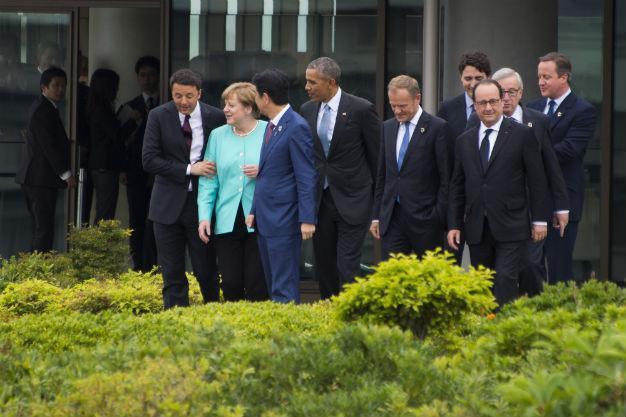G-7 leaders voice concern about emerging economies
ISE-SHIMA - Reuters

AP photo
Group of Seven leaders voiced concern about emerging economies on May 26 as their host, Japanese Prime Minister Shinzo Abe, made a pointed comparison to the global financial crisis eight years ago.Abe said the G-7 leaders agreed on the need for flexible spending to spur world growth but the timing and amount depended on each country, Deputy Chief Cabinet Secretary Hiroshige Seko told reporters, adding some countries saw no need for such spending.
Britain and Germany have been resisting calls for fiscal stimulus.
“G-7 leaders voiced the view that emerging economies are in a severe situation, although there were views that the current economic situation is not a crisis,” Seko said after the first day of a two-day G7 summit in Ise-Shima, central Japan.
Abe presented data showing global commodities prices fell 55 percent from June 2014 to January 2016, the same margin as from July 2008 to February 2009, after the Lehman collapse.
Lehman had been Wall Street’s fourth-largest investment bank when it filed for Chapter 11 protection on Sept. 15, 2008, making its bankruptcy by far the biggest in U.S. history. Its failure triggered the global financial crisis.
Abe hopes, some political insiders say, to use a G-7 statement on the global economy as cover for a domestic fiscal package including the possible delay of a rise in the nation’s sales tax to 10 percent from 8 percent planned for next April.
The G-7 leaders are also expected to reaffirm their previous commitment to stability in the foreign exchange market.
European Council President Donald Tusk said earlier he would seek G-7 support for more global aid for refugees. A flow of migrants from Syria and elsewhere to Europe has confronted the continent with its biggest refugee crisis since World War Two.
“If we (G-7) do not take the lead in managing this crisis, nobody would,” Tusk told reporters.
Terrorism, maritime security
Other summit topics include terrorism, cyber security and maritime security, especially China’s increasing assertiveness in the East and South China Seas, where Beijing has territorial disputes with Japan and several Southeast Asian nations.
At a news conference late on May 25, Abe said Japan welcomed China’s peaceful rise while repeating Tokyo’s opposition to acts that try to change the status quo by force and urging respect of the rule of law - principles expected to be mentioned in a statement after the summit.
Asked if a G-7 summit was the right place to discuss the South China Sea, Chinese Foreign Minister Wang Yi told a briefing in Beijing it was up to the G-7 to decide.
“But we believe that no matter what the topic is, they should all adopt impartial and fair positions, and not apply double standards or strike alliances, and especially not take actions to escalate or provoke regional tensions,” he said.
Summit pageantry began when Abe escorted G-7 leaders to the Shinto religion’s holiest site, greeting U.S. President Barack Obama and other G-7 partners one-by-one at Ise Grand Shrine in central Japan, dedicated to sun goddess Amaterasu Omikami, mythical ancestress of the emperor.
Led by a white-robed priest, each leader walked across a bridge, took part in a tree-planting ritual, strolled through the expansive grounds and posed for a group photo.
Abe has said he hopes the shrine visit will provide an insight to the heart of Japanese culture. Critics say he’s catering to a conservative base that wants to put religion back in politics and revive traditional values.
The G-7 groups Britain, Canada, France, Germany, Italy, Japan and the United States.
















